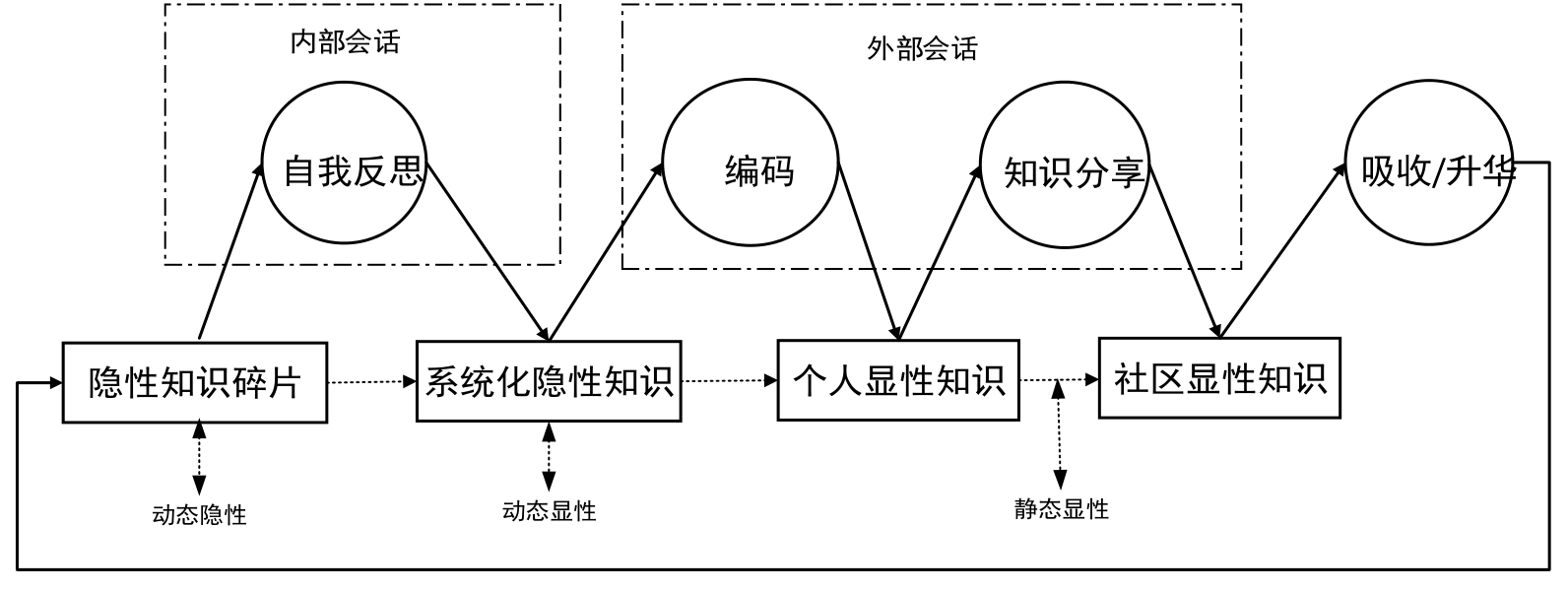 PDF(1848 KB)
PDF(1848 KB)


 PDF(1848 KB)
PDF(1848 KB)
 PDF(1848 KB)
PDF(1848 KB)
虚拟品牌社区成员隐性知识显性化影响因素与作用路径研究
Research on the Influencing Factors and Impact Paths of Tacit Knowledge Externalization among Virtual Brand Community Members
【目的/意义】 通过促进隐性知识的显性化,推动虚拟品牌社区内部的知识创新,为企业创新注入强大动力。 【方法/过程】 以小米社区成员为研究对象,对访谈数据进行编码分析与关系梳理,结合刺激—机体—反应(SOR)理论,构建虚拟品牌社区成员隐性知识显性化的影响因素及作用路径模型,最后针对个人、社区、品牌3个维度提出促进策略。 【结果/结论】 社区成员的风险感知和收益考量是影响隐性知识显性化行为的直接因素;成员的自我效能、内在驱动力,社区内的成员参与、社区内容与传播机制、社区管理与生态,以及成员对品牌的情感认同和对产品创新的持续关注则通过影响社区成员的风险感知和收益考量间接影响隐性知识显性化结果。
[Purpose/Significance] By facilitating the externalization of tacit knowledge, this study aims to drive knowledge innovation within virtual brand communities, ultimately injecting strong momentum into corporate innovation. [Method/Process] Using Xiaomi community members as research subjects, this study conducted coding analysis and relationship mapping of interview data. Grounded in the Stimulus-Organism-Response (SOR) theory, a model was developed to identify the influencing factors and pathways of tacit knowledge externalization among virtual brand community members. Finally, promotion strategies were proposed from three dimensions: individual, community, and brand dimensions. [Result/Conclusion] Community members' risk perception and benefit considerations are direct factors influencing tacit knowledge externalization behavior. Members' self-efficacy and intrinsic motivation, along with community-level factors (including member participation, content dissemination mechanisms, management, and ecosystem), as well as members' emotional identification with the brand and continuous attention to product innovation, indirectly affect tacit knowledge externalization by influencing members' risk perception and benefit considerations.

虚拟品牌社区 / 隐性知识显性化 / 扎根理论 / 知识创新 / 影响因素
virtual brand community / tacit knowledge externalization / grounded theory / knowledge innovation / influencing factor
| [1] |
新华社. 李强在政府工作报告中提出,大力推进现代化产业体系建设,加快发展新质生产力[EB/OL]. [2025-06-11]. https://www.gov.cn/yaowen/liebiao/202403/content_6936331.htm.
|
| [2] |
|
| [3] |
|
| [4] |
陶晨晨.消费者契合、价值共创与跨境电商企业创新绩效[J]. 商业经济研究, 2024(17): 163-166.
|
| [5] |
汪寿阳, 敖敬宁, 乔晗, 等.基于知识管理的商业模式冰山理论[J]. 管理评论, 2015, 27(6): 3-10.
|
| [6] |
|
| [7] |
李旭光, 朱学坤, 王奕霖, 等.虚拟品牌社区意见领袖在知识协同创新中的作用研究[J]. 情报理论与实践, 2022, 45(12): 146-155.
|
| [8] |
|
| [9] |
李贺, 彭丽徽, 洪闯, 等. 内外生视角下虚拟社区用户知识创新行为激励因素研究[J]. 图书情报工作, 2019, 63(8): 45-56.
|
| [10] |
|
| [11] |
|
| [12] |
|
| [13] |
|
| [14] |
周楚轶, 陶冶, 李游.基于文化知识解构与重构的传统手工技艺文化产品设计研究[J]. 包装工程, 2023, 44(16): 237-245.
|
| [15] |
|
| [16] |
申传斌.基于知识管理的隐性知识显性化研究[J]. 科技管理研究, 2005, 25(11): 232-235.
|
| [17] |
张敏, 马臻, 张艳.在线健康社区用户隐性知识显性化行为的扎根分析[J]. 图书馆学研究, 2019(1): 53-61, 93.
|
| [18] |
|
| [19] |
|
| [20] |
|
| [21] |
|
| [22] |
黄智慧, 王凤姣.图书馆知识转移生态化的机理及改进研究[J]. 图书馆学研究, 2021(22): 9-15.
|
| [23] |
库卡茨.质性文本分析:方法, 实践与软件使用指南[M]. 重庆: 重庆大学出版社, 2017.
|
| [24] |
|
| [25] |
|
| [26] |
|
| [27] |
王楠, 王莉雅, 李瑶, 等.同侪影响对用户贡献行为的作用研究——基于网络客观大数据的分析[J]. 科学学研究, 2021, 39(12): 2294-2304.
|
| [28] |
连婷婷, 袁曦临.基于互动仪式链理论的虚拟阅读社区研究——以豆瓣读书会小组为例[J]. 图书馆工作与研究, 2023(8): 59-64, 89.
|
| [29] |
|
| [30] |
王鹏民, 罗公利.主观博弈视角下虚拟学术社区用户知识交互行为分析[J]. 现代情报, 2022, 42(8): 61-73.
|
| [31] |
|
| [32] |
王爽.基于虚拟品牌社群的顾客忠诚度研究[D]. 石家庄: 河北科技大学, 2022.
|
| [33] |
谢笑莲.元宇宙赋能下学术虚拟社区知识共享行为及其驱动因素[J]. 图书馆工作与研究, 2023(10): 3-12, 22.
|
| [34] |
丁照军, 王富强, 张玲玲.挑战性—阻碍性压力源对隐性知识共享意愿影响的实证研究[J]. 图书情报工作, 2023, 67(19): 92-110.
|
| [35] |
胡刃锋, 刘国亮.移动互联网环境下产学研协同创新隐性知识共享影响因素实证研究[J]. 图书情报工作, 2015, 59(7): 48-54, 90.
|
| [36] |
|
| [37] |
|
李旭光:提出研究问题,指导研究工作实施;
胡奕:整理论文思路,撰写与修改论文;
王奕霖:整理论文思路,撰写与修改论文;
孙琛:整理论文思路,修改论文;
陆颖颖:整理论文思路,提供修改方向。
/
| 〈 |
|
〉 |